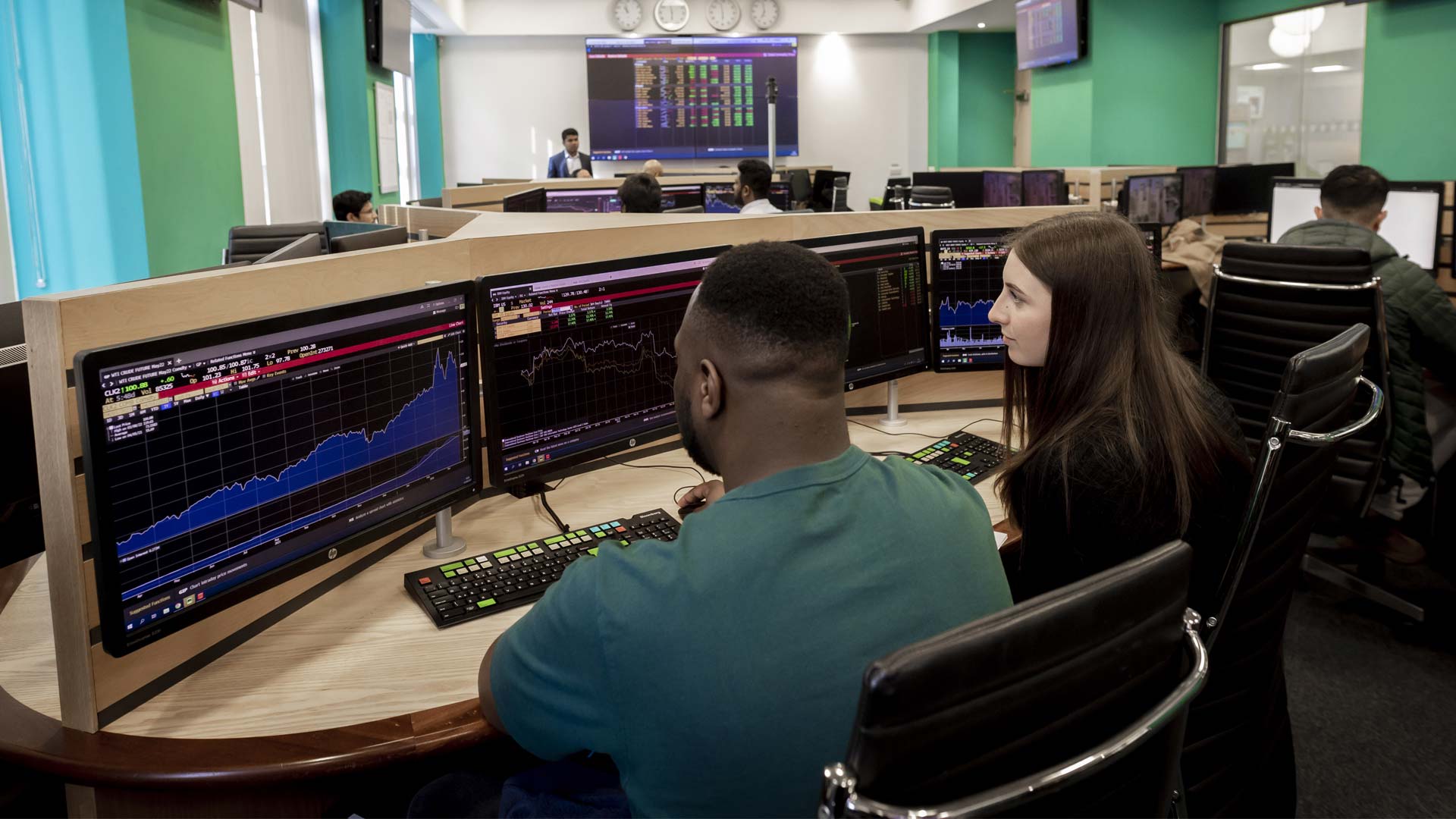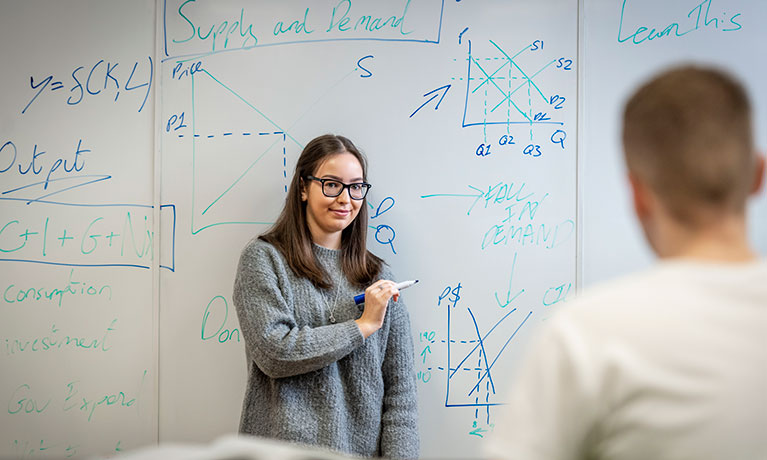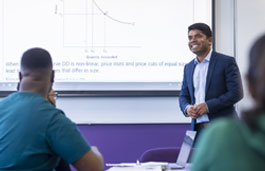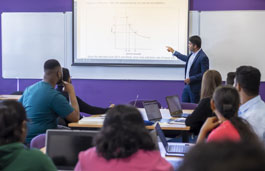Search
Financial Economics BSc (Hons)
Study level: Undergraduate
Unlock the power of financial markets and economic policy analysis with a degree designed to blend real-world economics, financial insight and practical skills for tomorrow’s finance and economics professionals.
Course option
Year of entry
Location
Coventry University (Coventry)
Study mode
Full-time
Sandwich
Duration
3 years full-time
4 years sandwich
UCAS codes
L111
Start date
September 2026
The information on this page is for 2025-26 entry and should be used as guidance for 2026-27 entry. Please keep checking back on this course page to see our latest updates.
Course overview
This course is designed for ambitious students eager to understand how economics shapes financial systems, markets and economies. The course offers practical, industry-relevant insights and skills to prepare you for a high-impact career in finance, economic policy or corporate strategy.
- Gain core expertise in financial markets, economics and quantitative methods.
- Apply theory to real-world challenges in business, corporate finance, international finance, portfolio management and policy.
- Develop critical thinking and analytical skills sought by top employers.
- Hone industry-relevant skills through economics games, specialist econometrics training and research support in our Economics Lab.4
Rated Gold Overall
Teaching Excellence Framework (TEF) 20235 QS Stars for Teaching and Facilities
QS Stars University RatingsTop 5 Student City in England (Coventry)
QS Best Student Cities Index 2025Why you should study this course
- Optional placement or study abroad year: boost your employability with an optional sandwich year where you can gain hands-on industry experience or study internationally.2
- Access to our EconLab: the Digital Economics Lab is designed to model decision-making, market dynamics and policy impacts to teach core principles such as resource allocation, opportunity cost and cooperation. It houses economics games which are used in education, research and policy testing and provides specialist econometrics support.4
- Access maths and statistics support: the sigma Maths and Stats Support Centre offers free support through drop-in sessions and bookable appointments.
- Access industry-standard tools: get hands-on with our Bloomberg Terminals, LSEG, Fitch Connect and other real-world data platforms (embedded in modules), giving you practical experience with tools used by economists and financial analysts.4
- Career and enterprise support: benefit from embedded career and optional enterprise support, helping you refine your CV, network with employers or even start your own business.2
- Join like-minded communities: enrich your student experience by becoming a member of a student-led society such as the Economics Society, the Investment Society and the Coventry Business Club Society.
- Benefit from real-world exposure: Network with like-minded professionals and visit key financial institutions, which have previously included Bloomberg, Cooper Parry Wealth and Fidelity International.2
- Embedded real-world projects: engage in industry-informed assessments and simulations embedded throughout the course, aimed at developing your skills in policy and economic analysis, business strategy and financial decision-making.
My Economics course proved instrumental in shaping my professional trajectory. The opportunity to study with class leading learning facilities along with a year-long placement exposed me to real-world applications, refining my analytical skills. This immersive experience, coupled with an amazing network of friends, lecturers and rigorous coursework on key economic factors, equipped me with a profound understanding that continues to guide my career decisions.
Justin Tay, Economics Alumni, currently working at HSBC (quoted 2024)

What you'll study
We regularly review our course content, to make it relevant and current for the benefit of our students. For these reasons, course modules may be updated.
How you'll learn
This course adopts a range of innovative teaching, learning and assessment methods such as the use of interactive teaching and learning online platforms, online quizzes, in-class feedback sessions, group projects, class experiments and bargaining simulations.
You will gain hands-on experience of relevant quantitative software and statistical packages, such as GRETL, as well as market leading economic and financial databases such as the Organisation for Economic Co-operation and Development (OECD), World Economic Indicators, the Office for National Statistics (ONS), EuroStat, Refinitiv (Thomson Reuters Eikon and Datastream) and FitchConnect.
You will also be taught in our Trading Floor room with access to a wealth of live and historical trading market data.
In addition, you will meet other students on the course and your tutors weekly during term time to engage in community-building activities, receive support and raise concerns relating to the course.
We understand that everyone learns differently, so each of our courses will consist of structured teaching sessions, which may include:
- on-campus lectures, seminars and workshops
- group work
- self-directed learning
- work placement opportunities2.
Teaching contact hours
As a full-time undergraduate student, you will study modules totalling 120 credits each academic year. You will normally study one 30-credit module at a time. A typical 30-credit module requires a total of 300 hours of study made up of teaching contact hours, guided and independent study.
Teaching hours
Teaching hours may vary depending on your year of study and selected modules. During your first year, you can expect 12-15 teaching hours each week. You will also have the option to attend additional sessions, including time with a progress coach or to meet with staff for advice and feedback. As you progress through your studies, teaching hours may reduce.
Guided and independent study
Throughout your studies, you will be expected to spend time in guided and independent study to make up the required study hours per module. You’ll be digging deeper into topics, review what you’ve learned and complete assignments. This can be completed around your personal commitments. As you progress through your studies, you’ll spend more time in independent study.
Online learning
As an innovative university, we use different teaching methods including online tools and emerging technologies. So, some of your teaching hours and assessments may be delivered online.
Assessment
This course will be assessed using a variety of methods which will vary depending upon the module.
Assessment methods may include:
- formal examinations
- phase tests
- essays
- group work
- presentations
- reports
- projects
- coursework
- exams
- individual assignments.
The Coventry University Group assessment strategy ensures that our courses are fairly assessed and allows us to monitor student progression towards achieving the intended learning outcomes.
International experience opportunities
In the past, our students have had the opportunity to visit universities in China and Malaysia to study alongside students, see how finance is taught internationally, appreciate the issues in different countries and broaden their perspectives.
Closer to home, you may have the opportunity to participate in European field trips2 which, in the past, have included events such as the annual Tax Week initiative or the annual Audit Week, both of which were conducted in collaboration with European universities, and saw students work collaboratively on related projects.
Please note that all international experience opportunities may be subject to additional costs, competitive application, availability, and meeting applicable visa and travel requirements, and are therefore not guaranteed2.
My dedication is in empowering students to navigate the intricacies of economic theory and policy with confidence. I believe in fostering an environment where students challenge conventional wisdom, explore diverse perspectives, and critically analyse economic issues, including their ethical and societal implications. With experience in policy analysis gained from my tenure in government and a PhD in Economics, I bring a unique blend of academic rigor and real-world insight to the classroom. As a Senior Fellow of the Higher Education Academy, my commitment is to nurture the next generation of economists and equip them with the skills and knowledge to thrive in their academic and professional pursuits.
Dr Ejike Udeogu, Economics Course Director in Economics, 2024

Each year we were given the opportunity to take part in a Collaborative Online International Project (COIL) with other students from foreign universities where we would tackle a topical economic issue and provide policy recommendations for governments in our respective countries. My best experience of the COIL project was with the University of Cape Coast in Ghana, where we compared the effectiveness of government-imposed price controls on UK energy markets, and the market for cocoa beans in Ghana. The regular zoom meetings with fellow students and lecturers ensured we produced an interesting essay, and overall this was very fulfilling.
Alex Hill, Economics BSc (quoted 2023)

Entry requirements
Typical entry requirements:
Not got the required grades? We offer this degree with an integrated foundation year.
Fees and funding
| Student | Full-time | Part-time |
|---|---|---|
| UK, Ireland*, Channel Islands or Isle of Man | 2026/27 fees TBC 2025/26 fees: £9,535 per year |
Not available |
| EU | 2026/27 fees TBC 2025/26 fees: £9,535 per year with EU Support Bursary** 2026/27 fees TBC 2025/26 fees: £16,800 per year without EU Support Bursary** |
Not available |
| International | 2026/27 fees TBC 2025/26 fees: £16,800 per year |
Not available |
If you choose to study this course with a professional placement2 or study abroad year, you will need to pay a tuition fee3 to cover your academic support throughout your placement year. Students commencing their professional placement in the academic year 2027/28 will pay £1,500 if they are paying UK fees, or £1,800 if they are paying international fees.
For advice and guidance on tuition fees and student loans visit our Undergraduate Finance page and see The University’s Tuition Fee and Refund Terms and Conditions.
The University will charge the tuition fees that are stated in the above table for the first Academic Year of study. The University will review tuition fees each year. For UK (home) students, if Parliament permits an increase in tuition fees, the university may increase fees for each subsequent year of study in line with any such changes. Note that any increase is expected to be in line with inflation.
If you choose to study this course with a professional placement, the University will charge the tuition fees stated above for those on a placement during Academic Year 2027/28. The University will review professional placement tuition fees each year. For UK (home) students, the University may increase fees for each subsequent year of study, but such that it will be no more than 5% above inflation.
For international students, we may increase fees each year, but such increases will be no more than 5% above inflation. If you defer your course start date or have to extend your studies beyond the normal duration of the course (e.g. to repeat a year or resit examinations) the University reserves the right to charge you fees at a higher rate and/or in accordance with any legislative changes during the additional period of study.
We offer a range of International scholarships to students all over the world. For more information, visit our International Scholarships page.
Tuition fees cover the cost of your teaching, assessments, facilities and support services. There may be additional costs not covered by this fee such as accommodation and living costs, recommended reading books, stationery, printing and re-assessments should you need them. Find out what's included in your tuition costs.
The following are additional costs not included in the tuition fees:
- Any optional overseas field trips or visits: £400+ per trip.
- Any costs associated with securing, attending or completing a placement (whether in the UK or abroad).
*Irish student fees
The rights of Irish residents to study in the UK are preserved under the Common Travel Area arrangement. If you are an Irish student and meet the residency criteria, you can study in England, pay the same level of tuition fees as English students and utilise the Tuition Fee Loan.
**EU Support Bursary
Following the UK's exit from the European Union, we are offering financial support to all eligible EU students who wish to study an undergraduate or a postgraduate degree with us full-time. This bursary will be used to offset the cost of your tuition fees to bring them in line with that of UK students. Students studying a degree with a foundation year with us are not eligible for the bursary.
Facilities
Our facilities and technology aim to replicate what you would expect in real-world industry environments4.
Facilities are subject to availability. Access to some facilities (including some teaching and learning spaces) may vary from those advertised and/or may have reduced availability or restrictions where the university is following public authority guidance, decisions or orders.

The Trading Floor
The Trading Floor is an invaluable facility that allows you to get hands-on with industry-standard software. Featuring contemporary dual-screen Bloomberg terminals, the facility adds a dynamic practical element to your course.

Lanchester Library
The library is usually open 24/7, in term-time. It’s where you can access your course’s specialist Academic Liaison Librarian. It’s also home to specialist teams which can support you with your academic writing and maths and statistics questions.

Careers and employability
Get one-on-one career and employability guidance lasting up to 36 months from the end of your course. We’ll help you find placements and graduate roles, offer CV and application checks, mentoring, skills workshops, employer events and more.
Careers and opportunities
Upon successful completion, you will be able to:
- critically evaluate modern economic theories and the empirical methods used by economists
- demonstrate knowledge of the workings of economic systems, both within the UK and the wider global economy, including the ability to interpret relevant data and evaluate government policies
- apply the theories and empirical methods of financial economics to real-world situations, by making appropriate use of data, abstraction, and logical reasoning in order to analyse the behaviour of financial markets and institutions
- communicate technical concepts related to financial economics and policy debates to a diverse range of audiences, and develop the ability to influence relevant stakeholders
- examine issues of sustainability and ethics from an economic perspective, and critically appraise the ethical and sustainability implications of economic policy
- integrate issues of national economic policy and analysis into a global context, and hence appreciate the value of international cooperation
- use a range of entrepreneurial, innovative and transferable skills, such as writing clear and concise reports based on evidence and logic, making effective use of information technology, confident delivery of presentations, creative problem solving, financial skills and self-motivation.
In addition to the financial sector, economics graduates are employed in a range of sectors and roles. They work in manufacturing, transport, communications, consulting, charitable organisations and public services such as the National Health Service (NHS).
Where our graduates work
Upon successful completion, you should be well placed to pursue a wide variety of potential careers options in investment banking, accountancy, tax consultancy, government economists, auditing, derivatives trading, management, financial consultancy, mergers and acquisitions, and many more.
Typical roles that graduates from this course may progress to include consultant, business analyst, junior trader or buyer.
Further study
Alternatively, you may decide to pursue postgraduate study opportunities by studying courses such as Accounting and Financial Management MSc or Finance MSc at Coventry Business School, which could further enhance your employability. You may be entitled to an alumni discount on your fees if you decide to extend your time with us by progressing from undergraduate to postgraduate study.
Please note that further study opportunities are subject to competitive application, availability, meeting any applicable visa requirements and additional costs may apply.

Discover Phoenix+
Phoenix+ brings you together with other students to learn, experience and develop essential knowledge and skills. Whatever destination you choose, it's about preparing you for life after university.
Learn more about Phoenix+How to apply
You may also like

Economics BSc (Hons)

Business Economics BSc (Hons)






